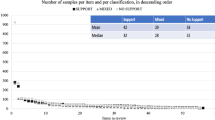Abstract
An ongoing debate in comparative research is about whether we should see cultural diversities as manifestations of essential differences or as superficial variations on a universal blueprint. Edward Slingerland has pointed to cognitive science and the use of embodied metaphors to emphasize the universality of concept formation and cognition across cultures. He suggests that this should quiet the “cultural essentialists” who take fundamental differences in Eastern and Western thinking as their starting points. Michael Puett has also leveled a critique of cultural essentialism in support of a presuppositionless approach, and Slingerland’s conclusions seem to offer him support. However, I will argue that even if all modern humans are broadly similar in metaphor use and cognitive processes, research in the humanities must continue to account for the differences implied by the particular metaphors employed and emphasized in diverse traditions. I contend that responsible hermeneutic practice does this through provisional, yet indispensable, generalizations.
Similar content being viewed by others
References
Ames, Roger T. 2011. Confucian Role Ethics: A Vocabulary. Honolulu: University of Hawai’i Press.
Aristotle. 1966. Metaphysics. Trans. by Hippocrates G. Apostle. Bloomington: Indiana University Press.
Burik, Stephen. 2015. “Polemos and Dao: Conflict and Harmony in Heidegger and Zhuangzi.” In Conflict and Harmony in Comparative Philosophy, edited by Aaron Creller. Newcastle: Cambridge Scholars Publishing.
Camus, Rina Marie. 2017. “Comparison by Metaphor: Archery in Confucius and Aristotle.” Dao: A Journal of Comparative Philosophy 16.2: 165–185.
Cheng, Chung-ying. 1989. “On Harmony as Transformation: Paradigms from the Yijing.” Journal of Chinese Philosophy 16.2: 125–158.
Dewey, John. 2005. Art as Experience. New York: Perigree.
Heidegger, Martin, and Eugen Fink. 1993. Heraclitus Seminar. Trans. by Charles H. Seiber. Evanston: Northwestern University Press.
Heraclitus. The Complete Fragments. Trans. by William Harris. http://wayback.archive-it.org/6670/20161201175133/http://community.middlebury.edu/~harris/Philosophy/Heraclitus.html (last accessed August 2018).
Kepler, Johannes. 1980. Astronomia Nova de Motibus, as quoted in Morris Kline, Mathematics: The Loss of Certainty. Oxford: Oxford University Press.
______. 1997. The Harmony of the World. Trans. by E. J. Aiton, J. V. Field, and A. M. Duncan. Philadelphia: The American Philosophical Society.
Lakoff, George, and Mark Johnson. 1999. Philosophy in the Flesh. New York: Basic Books.
Li, Chenyang. 2014. The Confucian Philosophy of Harmony. New York: Routledge.
Look, Brandon C. 2013. “Gottfried Wilhelm Leibniz.” In The Stanford Encyclopedia of Philosophy (Summer 2017 Edition), edited by Edward N. Zalta. https://plato.stanford.edu/archives/sum2017/entries/leibniz/ (last accessed August 2018).
Mason, Joshua. 2014. Justice and Harmony as Complementary Ideals: Reconciling the Right and the Good through Comparative Philosophy. Doctoral dissertation, University of Hawai’i at Manoa. https://scholarspace.manoa.hawaii.edu/bitstream/10125/100405/1/Mason_Joshua_r.pdf (last accessed August 2018).
Michael, Thomas. 2003. “Debating the Spirit in Early China.” The Journal of Religion 83.3: 421–429.
Moeller, Hans-Georg. 2006. The Philosophy of the Daodejing. New York: Columbia University Press.
______. 2011. “A Short Response to Edward Slingerland.” Dao: A Journal of Comparative Philosophy 10.4: 535–536.
Nisbett, Richard. 2003. The Geography of Thought. New York: The Free Press.
Nylan, Michael. 2003. “Michael J. Puett. To Become a God: Cosmology, Sacrifice, and Self-Divinization in Early China.” The American Historical Review 108.4: 1117–1118.
Plato. 1997. “The Republic.” In Plato: Complete Works, edited by John M. Cooper, trans. by G. M. A. Grube, and revised by C. D. C. Reeve. Indianapolis: Hackett.
Puett, Michael. 2004. To Become a God: Cosmology, Sacrifice, and Self-Divinization in Early China. Cambridge, MA: Harvard University Asia Center.
Shen, Vincent. 2005. “Metaphor and Narrative in Taoism and Buddhism.” In Cultural Traditions and Contemporary Challenges in Southeast Asia: Hindu and Buddhist, edited by W. Sriwarakuel, M. Dy, J. Haryamoto, N. T. Chuan, and Y. Chhay. Washington, D.C.: The Council for Research in Values and Philosophy.
Slingerland, Edward. 2008a. “Good and Bad Reductionism: Acknowledging the Power of Culture.” Style 42.2–3: 266–271. http://link.galegroup.com/apps/doc/A191393701/BIC1?u=west85252&xid=05a36a64 (last accessed March 2017).
______. 2008b. “Who’s Afraid of Reductionism? Religion in the Age of Cognitive Science.” Journal of the American Academy of Religion 76.2: 375–411.
______. 2008c. What Science Offers the Humanities. New York: Cambridge University Press.
______. 2011a. “Metaphor and Meaning in Early China.” Dao: A Journal of Comparative Philosophy 10.1: 1–30.
______. 2011b. “Reply to Prof. Moeller’s Response.” Dao: A Journal of Comparative Philosophy 10.4: 537–539.
______. 2017. “Metaphor, Blending, and Cultural Variation: A Reply to Camus.” Dao: A Journal of Comparative Philosophy 16.3: 431–435.
Tan, Sor-hoon. 2004. Confucian Democracy. Albany: SUNY Press.
Whitehead, Alfred North. 1967. Adventures of Ideas. New York: The Free Press.
______. 1985. Process and Reality. New York: The Free Press.
Wu, Kuang-ming. 1995. “Spatiotemporal Interpenetration in Chinese Thinking.” In Time and Space in Chinese Culture, edited by C.-C. Huang and E. Zürcher. Leiden: Brill.
Author information
Authors and Affiliations
Corresponding author
Rights and permissions
About this article
Cite this article
Mason, J. Generalizations, Cultural Essentialism, and Metaphorical Gulfs. Dao 17, 479–497 (2018). https://doi.org/10.1007/s11712-018-9625-7
Published:
Issue Date:
DOI: https://doi.org/10.1007/s11712-018-9625-7




